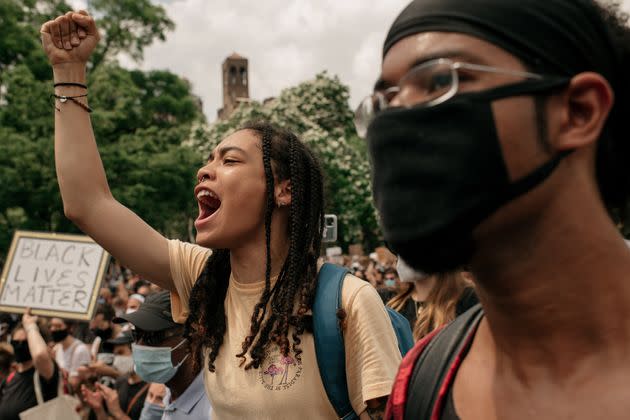Why This Word Used To Describe Systemic Racism Is So Damn Triggering

A recentstudy from Pew Research Center, which found that “most Black Americans believe U.S. institutions were designed to hold Black people back,” has gotten some backlash this past week. Although the report has since been revised to acknowledge its misstep, it originally used the term “racial conspiracy theories” to describe how Black Americans perceive bias.
This triggered me. Yes, most of us recognize systemic racism enough to call it out when asked — but its existence is a fact, not a “belief.”
The findings, which shared new data about the Black experience in America, are an extension of a series that aims to understand how Black Americans perceive individual success by identifying what it calls our “suspicions” about the barriers we face. The study surveyed 5,000 Black adults about whether they believed claims related to racial bias to be true or false.
Of the “suspicions” the study looked to explore, researchers found that about 60% of Black adults surveyed agreed that institutions such as policing, the criminal justice system and the country’s economic system are designed to hold Black people back.
These systems are flawed (or, frankly, broken altogether), and there’s evidence that they are stacked against us. We are not outsiders looking in on some social experiment. Black Americans currently live the daily experiences that prove the existence of historical and present-day racial bias.
Research has shown that “Black and Hispanic individuals are more likely than White people with similar criminal histories and charges to be arrested and held in jail before trial.” They also “tend to have higher bails set and receive lengthier and more punitive sanctions.”
There’s the yawning wealth disparity that stems from a discriminatory economic system — one that limited where Black Americans were allowed to work and live, and that still persists after centuries. According to more Pew research from just a few years ago, even in low-income households, white families have been shown to have an income four times higher than Black families. Also, it’s been shown that majority-Black school districts often receive less funding than districts with more white students.
All this just scratches the surface of why it feels reductive to frame research about Black Americans as “believing” in racial bias or “perceiving” institutional racism. And swiftly after social justice organizations such as JustLeadershipUSA vocalized their collective WTF at the word “conspiracy,” Pew revised their headline and issued an update.
When HuffPost reached out to Pew for comment, a representative said that they “cannot respond to an editorial that will not be shared” with them before publishing. However, they did offer to make themselves available to clarify any questions about their research or findings.
“We recently published a report focused on the suspicions that Black adults might have about the actions of U.S. institutions based on their personal and collective history with racial discrimination,” the Pew representative wrote. “The report emphasizes there is a long history of intentional or negligent harm against Black people in the United States.”
“Our decision to use a shorthand to describe a complex and mixed battery of findings was a poor choice,” the representative wrote, “and we have revised the report.”
The Pew report does provide important insight and reflection from members of our community — there’s no doubt about that. But seeing the word “conspiracy” in the report felt hurtful, because it implied that we’re being paranoid. Every day, conservatives are out here misusing terms and concepts like “woke” and “DEI,” and making claims about things like “reverse racism” to push back against efforts by Black Americans to address systemic injustice.
We’re not being paranoid. We’re just being honest.

